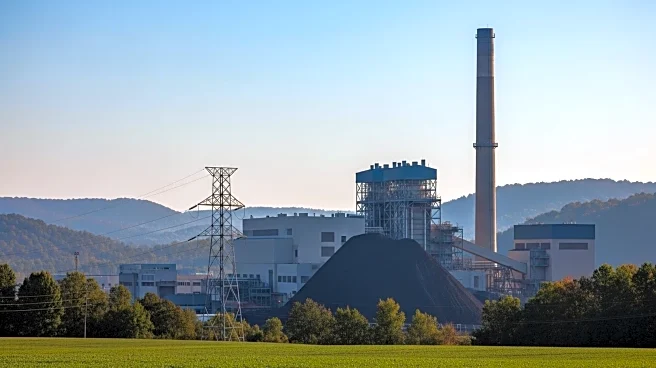What's Happening?
FirstEnergy Corp. has announced plans to construct a new 1,200-MW natural gas-fired combined-cycle power plant in West Virginia, as part of its Integrated Resource Plan (IRP) submitted to state regulators. The plan also includes maintaining operations at two major coal-fired power plants in the state for at least the next decade. The new gas-fired plant is expected to be operational by 2031, and the company aims to add 70 MW of solar power generation capacity by 2028. FirstEnergy's IRP supports West Virginia Governor Patrick Morrisey's '50 by 50' initiative, which seeks to increase the state's power generation capacity to 50 GW by 2050. The company serves over six million customers across several states and operates extensive transmission lines connecting the Midwest and Mid-Atlantic regions.
Why It's Important?
The development of a new gas-fired power plant and the continued operation of coal-fired plants by FirstEnergy are significant for West Virginia's energy landscape. This strategy aligns with the state's economic goals and energy infrastructure needs, potentially creating jobs and ensuring reliable power supply. The plan reflects a balance between traditional energy sources and renewable energy investments, which could influence future energy policies and economic growth in the region. The decision to maintain coal-fired generation highlights ongoing reliance on coal, which is a major contributor to the state's economy, despite environmental concerns associated with coal power.
What's Next?
FirstEnergy's proposal is likely to undergo regulatory scrutiny and public debate, particularly concerning environmental impacts and economic benefits. Stakeholders, including government officials, environmental groups, and local communities, may engage in discussions about the long-term implications of continued coal use and the transition to natural gas and solar power. The company's commitment to expanding solar capacity indicates a gradual shift towards cleaner energy sources, which could lead to further investments in renewable energy infrastructure in the future.
Beyond the Headlines
The plan underscores the complex dynamics of energy policy in regions heavily dependent on coal. While the introduction of a new gas-fired plant represents progress towards cleaner energy, the continued reliance on coal-fired power raises questions about environmental sustainability and regulatory challenges. The initiative may also influence national energy strategies, as states like West Virginia play a crucial role in shaping the country's energy mix and addressing climate change concerns.










